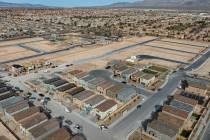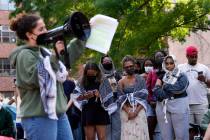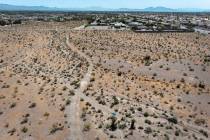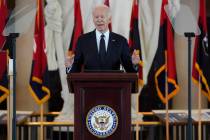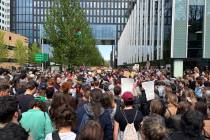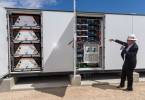Electric rate increase to boost average bills $125 per year
An average single-family household in Las Vegas will pay nearly $125 more for power in the next year, following a Wednesday decision of the Nevada Public Utilities Commission.
The increase is below the amount electric company NV Energy sought, but consumer advocates say it's an increase recession-battered ratepayers can ill afford.
The rate boost will raise the average single-family household's bill by 6.9 percent, or $10.29 a month averaged over a year.
NV Energy asked for a 16.7 percent rate increase for the residential single-family class. That amount would have pushed up the rate by $26 a month averaged over a year.
The commission's decision called for a 9.4 percent increase in single-family residential power rates. But commissioners factored in reductions based on expected drops in fuel costs to cap the actual increase at 6.9 percent.
The commission's order also requires a two-phase implementation of the new rates.
Starting July 1, rates will rise 3 percent, while the remainder of the increase will show up on power bills beginning Jan. 1.
The typical monthly summertime power bill, which the commission based on the use of 2,181 kilowatt hours, would increase $7.68, to $263.83.
Winter bills would rise $8.51 a month on average, to $129.38, based on 992 kilowatt hours used.
In drafting the NV Energy decision, Commissioner Sam Thompson said he aimed for a "just and reasonable" solution that balanced the interests of ratepayers and shareholders.
After hearing weeks of testimony in the spring and poring through thousands of pages of evidence filed by at least 13 parties, Thompson arrived at a rate raise he said was "absolutely necessary."
Commissioners and NV Energy officials say some increase is essential, because the utility has spent about $1.5 billion tripling its in-state power-generation capacity through plant purchases and expansions.
The goal us energy independence, so the company can avoid the whims of pricey wholesale power markets.
NV Energy Chief Executive Officer Michael Yackira called the commission's decision "pretty reasonable," although he didn't rule out legal action against parts of the decision.
"It's a huge document and we're still in the process of reviewing it," Yackira said. "We're not sure where we'll come out but, by and large, the commission was fair in its adjudication of this case."
Eric Witkoski, the state consumer advocate who represents ratepayers in utility rate cases, filed testimony supporting rates that would have been two percentage points below the commission's final order.
Still, Witkoski said after the decision Wednesday that he appreciated the commission's effort to ease the rate gain's impact on consumers.
"We won some adjustments, and we applaud the commission for that," Witkoski said.
"NV Energy made investments in their plants and, by law, they can seek to recover those costs in a rate case. But the commission, I think, recognizes our concern about a rate increase in this economy."
Thompson said he didn't want to minimize the importance of the increase, which he said would burden many families.
He also said residential power users are "at or near the saturation point" in their ability to absorb rate increases.
"When people are losing their jobs and homes, a few dollars makes a difference," Thompson said as he presented his draft order. "Ten dollars a month could be a lot of money if you're feeding a family, buying medication or putting gas in your car."
But the commission also needs to weigh the fiscal health of NV Energy, which must remain financially viable if it's to serve consumers, Thompson said.
The commission granted NV Energy about $221 million of the $310.9 million in revenue requirements the utility requested.
Commissioners also permitted an authorized return on equity for company investors of 10.5 percent, although Yackira noted that the utility's returns rarely reach the approved amount.
In 2008, for example, NV Energy could claim a return of as much as 10.7 percent, but the utility actually earned around 7 percent.
Wednesday's decision slightly modified Thompson's initial draft order of a week ago.
In that order, Thompson advised an increase of 9.3 percent, or 6.8 percent after fuel-cost adjustments. It granted a revenue requirement of $217.8 million, for an average increase of $10.05 a month over a year.
Thompson recommended a return on equity of 10.4 percent in that order.
But Commissioner Rebecca Wagner argued for a little more of a return.
Commissioners and NV Energy executives have worked on long-term strategies that would bring the utility an investment-grade status so it could secure reasonable rates on borrowed money, Wagner said, and it wouldn't benefit consumers if the state created the perception of a punitive regulatory climate.
Rumors of such an environment could scare away fresh capital.
Thompson agreed, and the commission's final order included Wagner's 10.5 percent return on equity.
Consumers won't feel the difference until January, when their bills will go up $8.51 a month, rather than the $8.31 a month in Thompson's draft order.
The commission has three members; but the third panelist, Jo Ann Kelly, recused herself from the case because of her family relationship with Boyd Gaming Corp., which intervened in the case.
Another case that could raise NV Energy's rates by about $6 a month will come before the commission later this summer, with possible increases set to take effect Oct. 1.
Declines in rates based on fuel costs could materialize in 2010.
Contact reporter Jennifer Robison at jrobison@reviewjournal.com or 702-380-4512.









